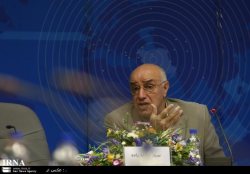ID :
237946
Sun, 04/29/2012 - 08:31
Auther :
Shortlink :
https://www.oananews.org//node/237946
The shortlink copeid
UAE Must Respect 1971 Treaty On Iranian Islands In Persian Gulf

Tehran, April 29, IRNA – Professor of geo-politics Pirooz Mojtahedzadeh said on Saturday that the United Arab Emirates must honor the Treaty of November, 29, 1971 on the three Iranian islands in the Persian Gulf.
Mojtahedzadeh said that number one fault with the UAE is its failure to respect the Treaty on ownership of Iranian islands.
He is a lecturer of the United Nations University, instructor of geopolitics doctoral studies at University of London and doctoral studies on the Persian Gulf at Oxford University.
He said that he prefers to designate November 30, the day of retaking ownership of Iranian Islands in the Persian Gulf from the UK as National Day for the Persian Gulf.
'The first fault with the UAE is that it does not respect November 1971 Treaty.'
He said that in November 1971 four radical Arab states – Iraq led by Saddam Hussein, Libya led by Muammar Gaddafi, Algeria and Yemen complained to United Nations over ownership of Iranian Islands and the UAE joined them after the Emirates emerged.
The then US and UK permanent ambassadors to UN in the meeting acknowledged Iranian ownership of the Persian Gulf Islands.
'This is a response to US President Barack Obama who has sided with UAE.'
He said that when Tony Blair was the UK prime minister, one of his aides had speculated about Iranian Islands. 'I wrote a letter to him to remind him that the UK had ended occupation of the Islands and gave them back to Iran in 1971. He later apologized for his unlawful remarks.'
Mojtahedzadeh said that he backed President Mahmoud Ahmadinejad's visit to Abu Mousa.
The president must have made such a visit to Iranian Islands to tell Obama that Abu Mousa is a part of Iranian territory.
He said that he has written an article to be published soon addressing Obama that if the US administration is ready to negotiate ownership of New York, Iran will consider negotiations on ownership of its islands.
He criticized the transitional government after victory of the Islamic Revolution in Iran for downgrading Iranian military power in the Persian Gulf and said that Iranian military was safeguarding the unique status of Iran in the Persian Gulf.
He also blamed the revolutionary government for decreasing Iranian oil output from six million bpd to three million bpd and said that in fact Iran helped other oil producing countries to get greater quota from the market.
The third fault with the revolutionary government was lack of objection from Iran to the Persian Gulf Cooperation Council, he said, adding that the deposed Shah's government tried to prevent the PGCC from take shape citing it a Saudi scheme.
'Instead of preventing the PGCC from taking shape, the revolutionary government called for membership in the anti-Iran grouping.'/end





